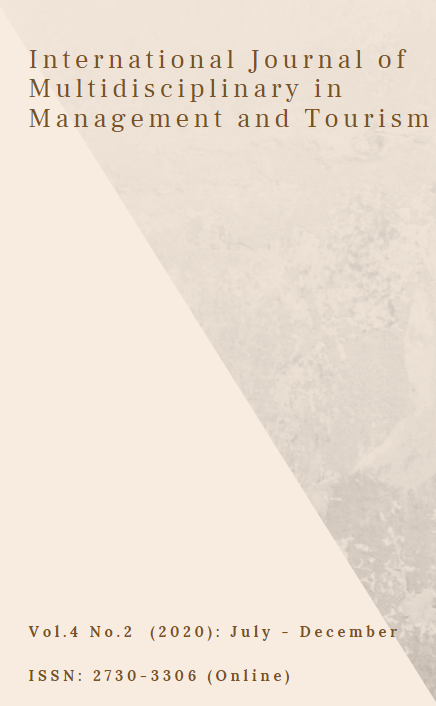Renewable Energy Policy Development in Thailand
Main Article Content
Abstract
This paper is attempting to explore renewable energy policy development in Thailand. Renewable energy is mostly derived from natural resources and hence considered clean and environmentally friendly. However, there exist some hindrances to the development of renewable energy and the costs of harnessing renewable energy resources are still high compared with the costs of using commercial energy, particularly, the development of solar and wind energy which require the use of high cost technology. Renewable energy that has high potential to be used in place of fossil energy includes, for example, hydropower, biogas and biomass energy, solar energy and geothermal energy. Studies and development on these energy sources have continuously been undertaken by several agencies, both at the local level initiated by local intellect and at the government level. At present, the development of renewable/alternative energy has become a focus of interest and wider utilization has been promoted to replace conventional energy consumption in parallel with the efforts to stimulate people to use energy efficiently and economically.
Article Details
References
APEC. (May 2008). The Future of Liquid Biofuels for APEC Economies. Retrieved September 12, 2020, from https://www.apec.org/Publications/2008/05/The-Future-of-Liquid-Biofuels-for-APEC-Economies-May-2008
APEC. (7-9 October 2008). Fifth Meeting of the Biofuels Task Force. Retrieved September 12, 2020, from https://www.ewg.apec.org/documents/ReportonFifthMeetingBiofuels TaskForce.pdf
ASEAN. (September 2011). ASEAN Documents Series 2009. Retrieved May 3, 2019, from https://www.asean.org/storage/images/2012/publications/Asean%20Document%20Series%20(ADS)2009.pdf
ASEAN. (n.d.). About ASEAN. Retrieved June 8, 2019, from https://asean.org/asean/about-asean/
ASEAN. (n.d.). Joint Ministerial Statement of the 26th ASEAN Ministers on Energy Meeting (AMEM) “ASEAN Cooperation to Strengthen Energy Security” Bangkok, 7 August 2008. Retrieved September 3, 2019, from https://asean.org/?static_post=joint-ministerial-statement-of-the-26th-asean-ministers-on-energy-meeting-amem-asean-cooperation-to-strengthen-energy-security-bangkok-7-august-2008
Department of Trade Negotiations. (n.d.). Japan-Thailand Economic Partnership Agreement (JTEPA). Retrieved July 23, 2019, from http://www.thaifta.com/english/eng_jp.html
Energy Policy and Planning Office, Ministry of Energy, Thailand. (30 June 2015). Thailand Power Development Plan 2015 – 2036 (PDP2015). Retrieved September 5, 2019, from http://www.eppo.go.th/images/POLICY/ENG/PDP2015_Eng.pdf
Energy Policy and Planning Office, Ministry of Energy, Thailand. (n.d.). Thailand: Energy and Natural Resources. Retrieved September 22, 2020, from http://www.eppo.go.th /images/policy/PDF/docs/Thailand_Energy_Brief.pdf
Energy Policy and Planning Office, Ministry of Energy, Thailand. (n.d.). Thailand National Energy Policy. Retrieved October 11, 2020, from http://www.eppo.go.th/index.php/ en/policy-and-plan/en-governmentpolicystatement
Greater Mekong Subregion. (n.d.) About the Greater Mekong Subregion. Retrieved July 23, 2019, from https://greatermekong.org/about
International Renewable Energy Agency. (2017). Renewable Energy Outlook Thailand: Based on Renewables Readiness Assessment and REmap analysis. Retrieved May 4, 2019, from https://www.irena.org/-/media/Files/IRENA/Agency/Publication/2017 /Nov/IRENA_Outlook_Thailand_2017.pdf
Ministry of Energy, Thailand. (n.d.). About the Energy Sector in Thailand. Retrieved August 7, 2020, from https://energy.go.th/2015/en/
Ministry of Energy, Thailand. (2009). Thailand in the 2010’s: Thailand’s Renewable Energy and its Energy Future: Opportunities & Challenges, 4-5
Ministry of Energy, Thailand. (n.d.). 15-Year Renewable Energy Development Plan (2008 – 2022). Retrieved October 22, 2020, from https://policy.asiapacificenergy.org/sites/ default/files/REDP%202008-2020.pdf (in Thai)
Ministry of Science, Technology and Environment, Thailand. (October 2000). Thailand’s Initial National Communication under the United Nations Framework Convention on Climate Change. Retrieved June 15, 2020, from https://unfccc.int/sites/default/files /resource/Thailand%20NC.pdf
Office of Natural Resources and Environmental Policy and Planning, Thailand. (n.d.). About ONEP. Retrieved October 18, 2020 from http://www.onep.go.th/ (in Thai)
Office of Natural Resources and Environmental Policy and Planning, Ministry of Natural Resources and Environment, Thailand. (February 2011). Thailand’s Second National Communication under the United Nations Framework Convention on Climate Change. Retrieved October 18, 2020 from https://unfccc.int/sites/default/files/ resource/SNC_THAILAND.pdf
Office of Natural Resources and Environmental Policy and Planning, Ministry of Natural Resources and Environment, Thailand. (n.d.). Thailand’s Third National Communication. Retrieved October 10, 2020 from https://unfccc.int/sites/default/ files/resource/Thailand%20TNC.pdf
Open Development Thailand. (19 December 2017). Environment and Natural Resources. Retrieved September 25, 2020, from https://thailand.opendevelopmentmekong.net /topics/environment-and-natural-resources/
Sitdhiwej, C. (2-4 December 2005). Laws in Thailand Promoting Renewable Energy: The Recent Developments. Retrieved September 20, 2020, from http://web.krisdika.go.th/ pdfPage.jsp?type=act&actCode=81
Thailand Greenhouse Gas Management Organization. (12 October 2011). CDM Project Approval Process in Thailand. Retrieved September 22, 2020, from https://carbonmarketwatch.org/wp-content/uploads/2012/06/cdm-thailand-greenhouse-gas-management-organization.pdf
Thailand Law Forum. (11 March 2011). Energy Industry Act B.E. 2550 (2007). Retrieved September 22, 2020, from http://thailawforum.com/database1/energy-industry-law. Html.

